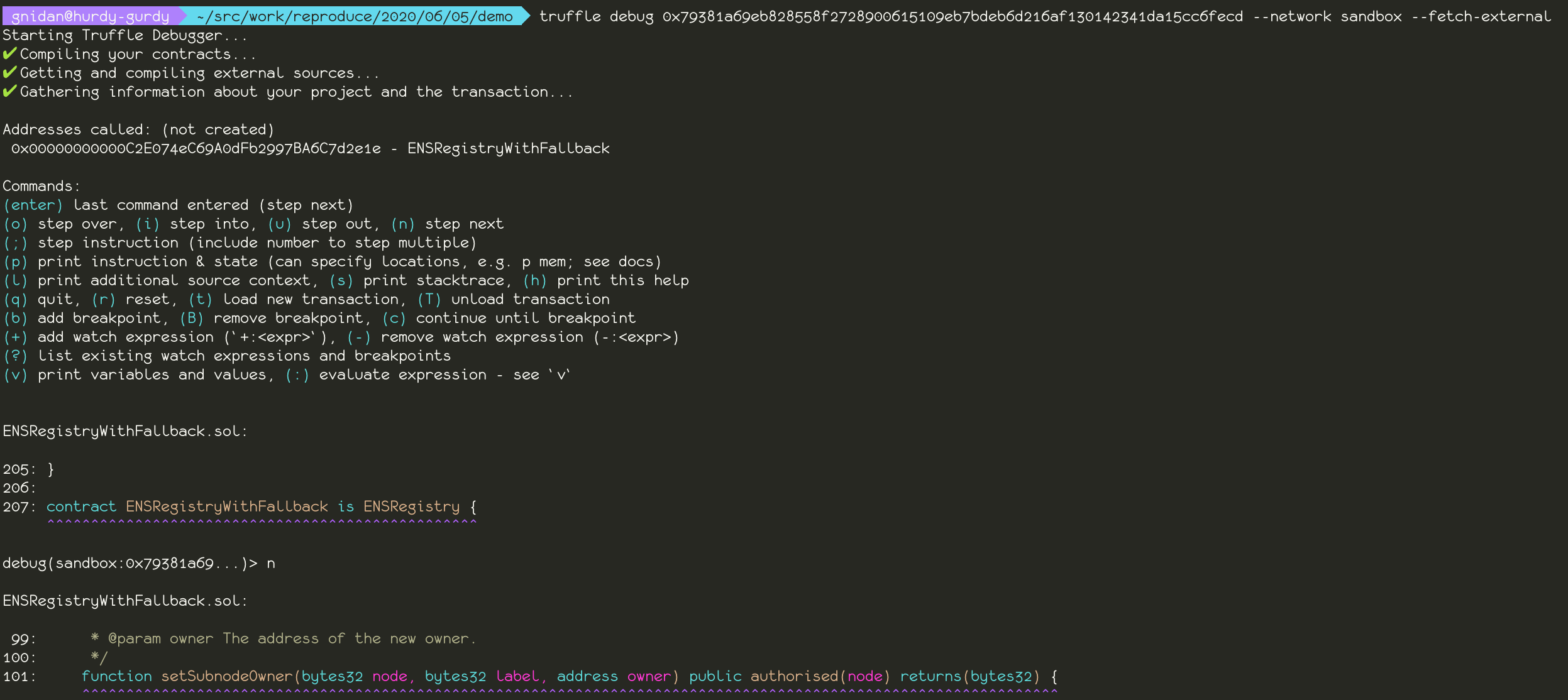Debugging verified external contracts with Truffle Debugger

Let's say you're crafting a clever flashloan transaction that interacts with five different DeFi dapps -- but on trying it, it doesn't work as expected. You open the transaction in Truffle Debugger to get a closer look at what went wrong. But how will you debug a transaction that the debugger doesn't have the source code for?
Well, new in Truffle release v5.1.29 is the debugger's --fetch-external flag! This new flag tells the debugger to search Etherscan's repository of verified contracts and automatically download and compile those sources. As long as all the contracts you're interacting with are verified on Etherscan, you're good to go!
This means you'll be able to debug Mainnet / Görli / Ropsten / etc. transactions that interact with external contracts without the need to have external contract source code available locally!
Now, before you get too excited, some caveats apply: - This only works with Solidity contracts, since @truffle/debugger only supports Solidity at this time. - While using this feature, you won't be able to load and unload transactions in the debugger like normal; you'll have to quit and restart to change transactions. - In order to be able to use the debugger and have it find the right source to download for your network, you'll need to connect to an archive node that offers the debug_traceTransaction JSON RPC method. (See Geth's Management APIs).
That last one is a pretty big caveat, but there's good news here! Our sibling SaaS project, Truffle Teams, now lets you simulate live networks via the free Sandbox feature. This works without requiring you to run your own node or to pay for someone else to run their own node, since Truffle Teams offers 1 free sandbox per GitHub organization!
Of course, you're free to use the debugger with whatever compatible Ethereum node you like, including command-line Ganache; but here's how to use Truffle Teams, which offers so much more, for this feature.
Example: Debug ENS in a [mostly] empty Truffle project!¶
This screenshot shows truffle debug stepping through a Görli transaction to the ENS registry. Once you upgrade to Truffle v5.1.29, you can recreate this by doing the following:
-
Find the Görli ENS contract page on Etherscan.
-
Find a recent transaction hash. (See example from screenshot.)
-
Sign up / login to Truffle Teams and make a free Sandbox that forks off Görli. Note: At the moment, you'll have to make sure that you manually specify that the Sandbox should use the same network ID as the chain it's forked from (in this case, 5). In the future, however, this step will be handled automatically. You can read more about Sandboxes in our earlier blog post on the subject.
-
Copy your sandbox JSON RPC url to the clipboard.
-
Run
truffle initand add this to your newtruffle-config.js(replacing"<paste RPC url>"with your clipboard contents from step 4):5a. Optional. If you have an Etherscan API key or feel like making one, you can specify that as well in yourmodule.exports = { /* ... rest of truffle-config.js ... */ networks: { /* ... rest of networks ... */ sandbox: { url: "<paste RPC url>", network_id: 5 } } }truffle-config.jsto speed up downloads:module.exports = { /* ... rest of truffle-config.js ... */ etherscan: { // replace this with your API key apiKey: "0123456789abcdef0123456789abcdef" } } -
Copy the transaction hash from step 2 and run the following (replacing
<transaction hash>with the0x-prefixed transaction hash):truffle debug <transaction hash> --network sandbox --fetch-external
And that's it! You're now debugging an ENS transaction in an empty Truffle project. You can step through and set breakpoints; inspect both decoded variables and the raw binary state; and get return values, revert messages, and stacktraces just like normal.
Now this example is a minimal one just to show how things work. But it will work just as well in your existing projects on transactions that feature your contracts in your project interacting with external verified contracts deployed on live networks.
Right now "verified contracts" just means contracts verified on Etherscan, but we're also looking at supporting the new Sourcify project, which provides a more decentralized alternative to Etherscan's repository. We plan to add this in an upcoming release. But as of right now, you can use this feature with Etherscan's large library of verified contracts!
Update: As of Truffle v5.1.32, Sourcify is now supported! Truffle Debugger will now check both Etherscan and Sourcify for verified contract sources!
Hope you find this as exciting as we do! Thanks for using Truffle!
 Click to enlarge
Click to enlarge